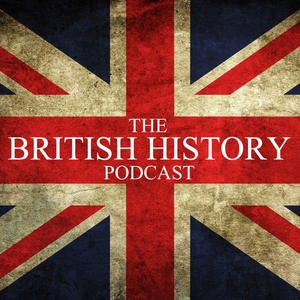
John Brown's Best Friend in the Twentieth Century
05/23/21 • 38 min
In this episode, Lou recalls the important role of Boyd B. Stutler (1889-1970), "the godfather of John Brown scholars." Lou sketches Stutler's life, from his youth as a newspaperman and one of the youngest mayors in his era, to his role as a war time correspondent and veterans' magazine editor. Above all, Stutler was the key figure in gathering John Brown materials, primary and secondary, and became the expert on Brown in the twentieth century. Yet, as Lou observes, Stutler was a rightwinger who held Brown at arms length and held a somewhat detached view of Brown in keeping with the prejudices of his era as well as his own ultra-conservative perspective. Stutler was particularly uncooperative in the case of Richard O. Boyer, a leftist author, and despite the latter's great capacity and success, might have been far more successful had Stutler not snubbed him because he was a "pinko." Notwithstanding Stutler's rightwing bias, his contribution to the study of John Brown is invaluable and his collection remains one of the great resources for John Brown biographers and students. If you're interested, you can visit the digital Stutler John Brown collection by clicking this link!
Hey friends, click on this link to get your JOHN BROWN TODAY Podcast Mug!
In this episode, Lou recalls the important role of Boyd B. Stutler (1889-1970), "the godfather of John Brown scholars." Lou sketches Stutler's life, from his youth as a newspaperman and one of the youngest mayors in his era, to his role as a war time correspondent and veterans' magazine editor. Above all, Stutler was the key figure in gathering John Brown materials, primary and secondary, and became the expert on Brown in the twentieth century. Yet, as Lou observes, Stutler was a rightwinger who held Brown at arms length and held a somewhat detached view of Brown in keeping with the prejudices of his era as well as his own ultra-conservative perspective. Stutler was particularly uncooperative in the case of Richard O. Boyer, a leftist author, and despite the latter's great capacity and success, might have been far more successful had Stutler not snubbed him because he was a "pinko." Notwithstanding Stutler's rightwing bias, his contribution to the study of John Brown is invaluable and his collection remains one of the great resources for John Brown biographers and students. If you're interested, you can visit the digital Stutler John Brown collection by clicking this link!
Hey friends, click on this link to get your JOHN BROWN TODAY Podcast Mug!
Previous Episode

Hurrah For Old John Brown: The July 4th 1860 Meeting at John Brown's Farm & Grave
In this John Brown birthday episode, Lou presents a reflection upon the "reunion" meeting at John Brown's farm that took place on July 4, 1860, before the Brown family sold the property and relocated to California three years later. Based on an account published in William Lloyd Garrison's The Liberator (July 27, 1860), Lou reflects on this meeting--attended by as many as one thousand people--its leading spirits, its family significance, even the fact that Brown had both a grave mound and a grave marker. As Lou points out, when this meeting took place, only Brown was interred at the farm; the bodies of his sons Oliver and Watson, along with the bodies of many of his other Harper's Ferry raiders were not interred at the farm until the last twenty years of the nineteenth century. The July 4th 1860 meeting is a weighty and moving historical "snapshot"--the picture of a nation on the brink of civil conflict, a nation weighed down by injustice and the suffering of black millions at the hands of white supremacy, and the mediocrity of most of white society, including "moderate" anti-slavery people. Quite in contrast the abolitionists stand out, and yet themselves are divided between pacifist "moral suasionists," and political abolitionists--militants who called for violence, and the significance of John Brown, buried beneath the fresh mound at North Elba, NY. Yet, because of the ongoing struggle against racism, somehow the story of John Brown--in life and death--remains significant today, as it was in 1860.
This episode is introduced and closed by the wonderful song, "All the Brave Young Men," written and performed by Greg Artzner and Terry Leonino, known as Magpie. You can find this song on Magpie's CD, "The Civil War: Songs & Stories Untold." Also see Magpie's website at Magpiemusic.com.
Hey friends, click on this link to get your JOHN BROWN TODAY Podcast Mug!
Next Episode

John Brown Remembrance (2020)
This is the edited audio of a short video done to commemorate the 220th birthday of John Brown in 2020. This brief reflection on Brown's life and significance entails his upbringing, biographical profile, his impact on anti-colonial revolutionaries, his cultural diminishment in the USA, and concludes with statements by Frederick Douglass (read by Michael Sweeting) and James Baldwin.
View the John Brown 2020 Remembrance here.
Hey friends, click on this link to get your JOHN BROWN TODAY Podcast Mug!
If you like this episode you’ll love
Episode Comments
Generate a badge
Get a badge for your website that links back to this episode
<a href="https://goodpods.com/podcasts/john-brown-today-227624/john-browns-best-friend-in-the-twentieth-century-25796712"> <img src="https://storage.googleapis.com/goodpods-images-bucket/badges/generic-badge-1.svg" alt="listen to john brown's best friend in the twentieth century on goodpods" style="width: 225px" /> </a>
Copy




